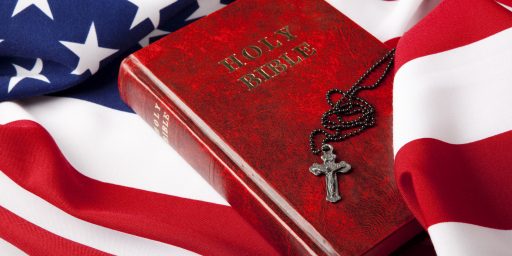Democrats and Religious Tolerance
Matthew Yglesias and Kevin Drum both argue that the Democratic Party would be wise to pick their battles on religious issues more wisely.
Matt began with a TAPPED post Wednesday citing a Pew survey reaffirming the extent to which Americans hold religious values and that only a very small, mostly white, elite is strongly against such things as public displays of the Ten Commandments. Today, on his own site, he offers:
If you ask me this and related issues would be fruitful areas for compromise. I wouldn’t say posting ten commandments on public buildings is a good idea. It strikes me as slightly silly, mildly wasteful, and vaguely offensive. But it’s honestly not a big deal. Abortion and reproductive rights matter. A lot. So does trying to maintain forward motion on the gay rights front. So do the basic economic issues, so does foreign policy. Ten commandments? “Under God” in the pledge of allegiance? Taxpayer dollars financing Christmas displays in the town square? That stuff doesn’t really matter. I’d be happier were it otherwise, but if that kind of token gesture toward the concept that this is a Christian (or, as they say, “Judeo-Christian,” whatever that means) country is what it takes to get support for a progressive political agenda, then sign me up.
Kevin agrees:
I think he’s right, and I say that from the perspective of someone who’s such a stone atheist that I’m pretty sure it’s not philosophically possible to be more atheist than me. Still, there are fights and there are fights, and some are more worth fighting than others.
Evolution? Worth fighting over, even if it costs us. Prayer in public classrooms? I’m agin it, but let’s face facts: we won 98% of this battle long ago. The last 2% probably isn’t worth too much bloodshed. Creche scenes in front of city hall? Lighten up.
My religious views mirror Kevin’s, although my political ideology often doesn’t. I’ve largely come to the same conclusions, though, in terms of intra-Republican Party squabbles. The social conservatives have more sway than I’d like over the party, but I’ve come to terms with the fact that there views are in accord with a far larger slice of the electorate than mine and that motivating that part of the base is crucial to getting what I want in other, more important, matters.
Ideally, of course, both parties would adopt the “it ain’t worth fighting for” stance on the more extreme parts of their platforms. Like it or not, though, party activists are–almost by definition–much more ideological than ordinary Americans. Because the activist core is more organized, more likely to contribute, and more likely to vote, they hold sway far out of proportion to their size.





That both of them are making similar noises now… noises they were not, just a year ago, I will take as proof that if you hit a cat over he head with a large enough hammer, it WILL blink.
Of course this has no bearing on those in the pits of the DU blinking under similar conditions. They’ve proven themselves time and again to be totally devoid of active nerous systems.
Come to think of it… isn’t it interesting that these freedom fighters are still arguing over the concept of how and when he can push his irreligion off on the rest of us, under the mutually exclusive banners of both ‘law’ and ‘freedom’.
I look forward to the inscription of Qur’anic verses outside Bithead’s local courthouse.
And that would be valid, if the culture had connections to it.
It does not.
As I said elsewhere:
This is not a chuch and state argument. I submit this entire discussion is mis- cast.
If we understand (as I have argued for years) that the purpose of government is to codify and enforce the values of the culture that gave it life, and also to hopefully extend the influence of that culture within the world… then the influence of religious values in our government will be a product of the degree to which religion is a part of the culture itself. This is not mandating religion; it is simply reacting to,a nd holding respect for the culture, as government should; this is the proper relationship.
This is not, therefore, a matter of church and state (And the mythical separation thereof) as much as it is a discussion about the culture, and the influence of religion in it, which is another matter altogether.
Consider the words of John McCandlish Phillips, a former reporter at the NYT:
—
“The fact is that our founders did not give us a nation frightened by the apparition of the Deity lurking about in our most central places. On Sept. 25, 1789, the text of what was later adopted as the First Amendment was passed by both houses of Congress, and subsequently sent to the states for ratification. On that same day , the gentlemen in the House who had acted to give us that invaluable text took another action: They passed a resolution asking President George Washington to declare a national day of thanksgiving to no less a perceived eminence than almighty God.
That’s president , that’s national, that’s official and, alas, my doubting hearties, it’s God… all wrapped up in a federal action by those who knew what they meant by the non-establishment clause and saw their request as standing at not the slightest variance from it.”
—
While other religions (Or for that matter, atheists, which I will include as a faith unto itself) are accepted by both law and the tradition of western culture, they are never more than a minority influence in our culture. And that seems to be to be the most troubling to Hitches of the world and to the Randians as well.
And is, I suppose the basis for your comment.
“Culture”? This would surprise the advocates of splashing the 10 Commandments (Protestant version? Catholic?) around.
The arguments pro & con are familiar to everyone reading this blog, I suppose. FWIW, Drum & Yglesias are probably right, and if self-proclaimed Christians want to debase the 10 Commandments to the level of “one nation, under God,” then who am I to suggest that mixing religion & government is detrimental to both?
No, it wouldn’t…
You see, they understand that the Judeo-Christian ethic has always been at the root of western culture.